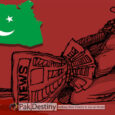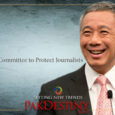For the last decade, Pakistan has been one of the world’s most dangerous countries for the media.
At least 46 journalists have been killed, 24 of them murdered for the “crime” of covering the intelligence services, the Taliban, separatists in Baluchistan, or the criminal underworld.
The result is a legacy of self-censorship and fear among the Pakistan press; critical stories go unreported.
Until early March, there had not been a single conviction in any one of these cases. Then a Pakistani anti-terror court announced a surprising verdict: Six people were convicted in the 2011 murder of journalist Wali Khan Babar, a well-known television reporter who covered local politics in Karachi.
Can Pakistan lift the veil of fear by convicting the killers of journalists? This was a question that Ahmed Rashid, Pakistani journalist and author, Joel Simon, CPJ executive director, and I asked Prime. Minister Nawaz Sharif when we met on March 19. Sharif had been in office less than a year and the moment seemed ripe for reform and change. Sharif began the meeting by paying tribute to Richard Holbrooke, my late husband and U.S. President Barack Obama’s special representative to Afghanistan and Pakistan. He recalled a phone call he received from Richard, warning about a security threat and urging him to take appropriate precautions. In Pakistan, the human connection matters deeply.
I then shifted the conversation to the need to go after the killers of journalists, proposing specific steps that the government could take, such as changing trial venues to avoid attacks; providing greater protection to witnesses; focusing attention on the most prominent cases; and creating special prosecutors to handle attacks against the press. I also urged the prime minister to place press freedom and security high on the agenda in his upcoming peace negotiations with the Taliban, who routinely threaten, attack, and kill journalists who criticize them.
Rather than the defensive push-back we usually get from heads of state on similar missions, Sharif was receptive to our ideas for achieving justice, recognizing that Pakistan’s record of impunity has damaged the country’s international reputation.
Remarkably, Sharif embraced our proposals and added one of his own: He announced the creation of a joint government-media commission to review outstanding cases and seek strategies for improving security. Ahmed Rashid agreed to serve on the committee. Even veteran victims of the violence, such as Umar Cheema of The News International, expressed cautious optimism. In 2010, Cheema–who had done national security reporting–was abducted, tortured, and then dumped on a roadside. Still defiant, Cheema went straight to a TV station and let the country see the uncensored image of what he called “state-sponsored violence.” This week, Cheema was hopeful for his own and his country’s future.
Over the course of my two decades of work at CPJ, I have participated in many meetings with high officials–from Angola to Russia–and have heard all sorts of promises. It is easy to make such commitments to members of an international delegation, knowing they will be on a plane out of the country in a few days. But the exchange and follow-up from other Pakistani officials were encouraging. The day after our conversation, the prime minister publicly praised the media’s role in strengthening Pakistan’s democracy.
We shall, of course, continue to monitor progress on all these fronts. But such engagement with dissent by a head of state is without precedent in the Muslim world. Of course, another far less visible but perhaps even more powerful actor remains in the shadows here, the notorious Inter-Services, or ISI, responsible for many attacks on journalists over the years. Prime Minister Sharif, however, understands that his country is desperately in need of good news, and this week he delivered some. – By Kati Marton/CPJ Board Member/Pak Destiny
46 journalists killed in Pakistan last decade
March 22, 2014
Related
-
April 3, 2019 0






